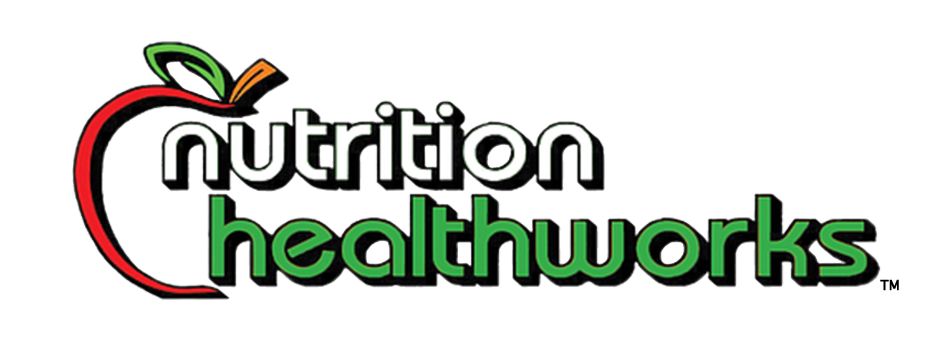
Inadequate calories and nutrients can impair even the most conditioned athlete, while the right balance of energy and macronutrients will help all athletes perform their best.
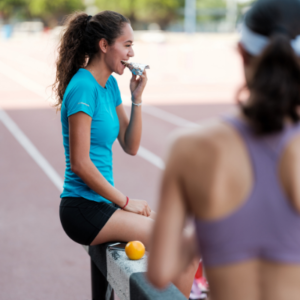
The ideal diet for an athlete is not very different from the diet recommended for any healthy person. The amount of each food group needed, however, will depend on the type of sport and the time spent playing and training. People tend to overestimate the number of calories they burn per workout, so it is important to avoid taking in more energy than expended while exercising. Calories fuel the body for exercise and replace the energy that is used during sports performance. Cutting calories by skipping meals or working out on an empty stomach prevents optimal performance and makes it more difficult for the body to recover quickly after a workout. Eating regular meals and healthy snacks is the best way to fuel your body for athletic events. Because different foods have different nutrients, continue to eat a variety of foods to get all the nutrients needed to stay in peak condition. Fuel your body right by giving it the proper balance of carbohydrates, proteins, fats, minerals, vitamins, and water! To gain a better understanding of proper nutrition for athletes, we will focus first on the macronutrient needs of athletes: carbohydrates, proteins, and fats.
Macronutrient Breakdown For Athletes
Carbohydrates for Athletes
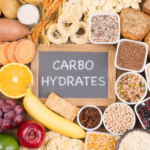
Carbohydrates (found in grains, dairy products, fruits, and some vegetables) are especially important for athletes because they supply the body’s first source of energy in the form of glucose. Extra glucose is stored in the muscles and liver as glycogen, your energy reserve. During short bursts of exercise such as sprinting, basketball, gymnastics, or soccer, your body relies on glycogen to keep your blood sugar levels stable and maintain your energy. If you don’t have enough glycogen, you may feel very tired or have difficulty sustaining the activity! During longer exercise, your body uses your glycogen stores first, then turns to stored fats to fuel performance. Complex carbohydrates found in pasta, bagels, whole-grain bread, and rice are low in fat and provide energy, fiber, vitamins, and minerals. Simple sugars such as juice, jams, and candy provide lots of calories but they do not provide vitamins, minerals, and other nutrients. What matters most is the total amount of carbs you eat each day. A little more than half of your calories should come from carbohydrates and 50% of these should be complex whole-grain types.
Fats for Athletes
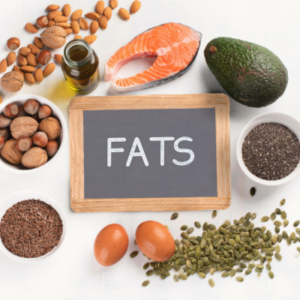
Fats are an important energy source used to fuel longer exercise and endurance activities such as hiking, cycling, and long-distance running or swimming. Eating a diet that is too low in fat may reduce athletic performance. Alternatively, a diet too high in fat before exercising can make you feel sluggish and tired because fats take longer to digest. Focus on heart-healthy fats at least 5-6 hours pre-workout or 2-3 hours post-workout such as avocados, salmon, nuts and nut butter, and olive and canola oils.
Protein for Athletes
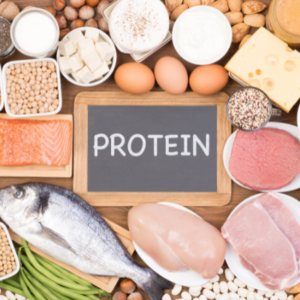
Protein is needed for your body to build and repair muscles. Small amounts of protein also can be used as your body’s last source of energy when glucose and fats are not available, but this should be minimized to avoid muscle loss. Protein can be found in lean meats like chicken and turkey, beans, tofu, eggs, and low-fat dairy products such as Greek yogurt. Although some extra protein is needed to build muscle, most Americans already eat almost twice as much protein as they need for muscle development. Getting extra protein from supplements won’t have an added benefit. Too much protein in your diet will be stored as increased body fat and can increase the chance for dehydration. It can lead to loss of calcium and can put an added burden on the kidneys. Eating calories is actually more important for building muscle than having extra protein. Without enough calories, your body can’t build new muscle!
Pre & Post Workout Nutrition
Never start a workout with an empty tank! Remember, as an athlete, you should be eating every 3-4 hours. A pre-workout meal should take place 2-4 hours ahead of time and be high in carbohydrates, moderate in protein, and low in heart-healthy fats. An example would be 1/3 of a 9-inch plate with grain/starch ( whole grain spaghetti, brown rice), ¼ of the plate lean protein (chicken breast or salmon), and 1/3 of the plate a vegetable (salad) and a heart-healthy fat (avocado and olive oil-based dressing). Adding fresh fruit and low-fat dairy to your pre-workout meal will make it nutritionally complete (see the image below).
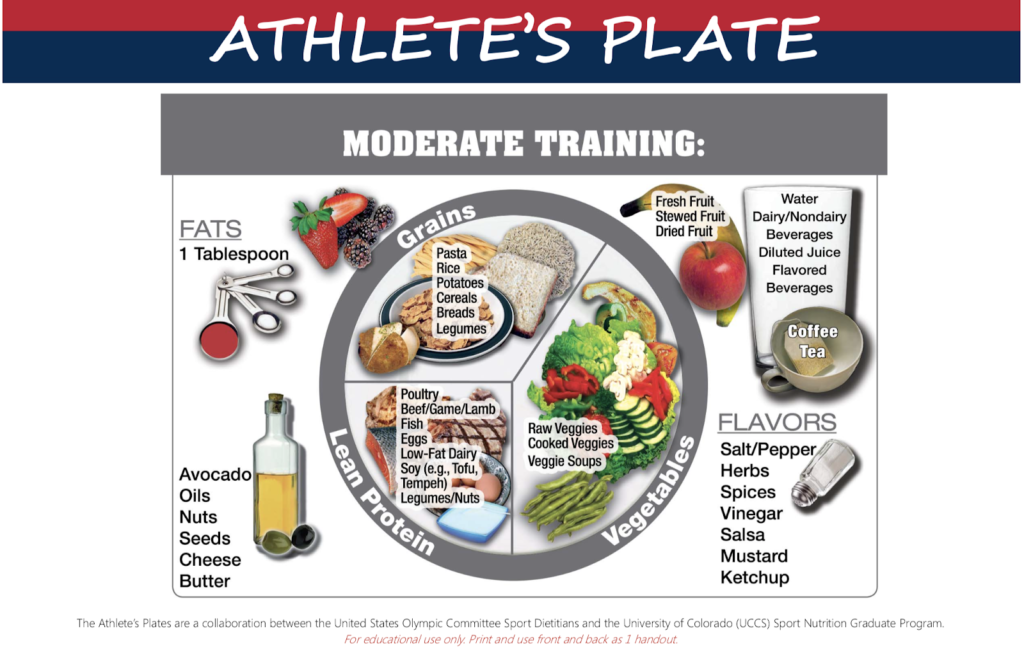
You should have a pre-workout snack 1-2 hours before exercise if you will be working out for more than 1 hour. It should consist of mostly carbohydrates with some protein and fat. During training, it is especially important to consume 30-60 grams of carbohydrate if the activity is intense and lasts longer than 60-90 minutes.
After 90 minutes of training, your body will not run on an empty tank and should be fueled within 30 minutes afterward with a snack similar to the pre-workout snack, containing some carbohydrates with some protein and fat. Two hours post-event is the time to eat a larger meal that is high in carbohydrates and has some protein to ready your body for the next day’s workout (see plate image below).
Ideal pre and post-workout snacks:
- Chocolate milk
- Greek yogurt and fruit
- Trail mix (nuts, seeds, dried fruit, cereal, popcorn, etc)
- String cheese and wheat crackers
- Sports bar/shake (at least 200 calories, 30 grams of carbohydrate, and 7 grams of protein, not more than 6 grams of fat)
- Peanut butter and jelly sandwich
- Cereal and skim milk
- Granola bar with 7 grams of protein and 8 oz Gatorade
Ideal during training > 60-90 minute snacks:
- 1/2 cup low-fat granola or dry cereal
- ½ cup pretzels
- Fruit leather
- Plain bagel
Dietitians at NutritionHealthworks are specially trained to help athletes fuel their bodies for training. Schedule an appointment today!
